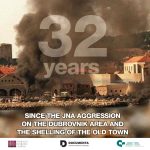- HRA kontakt
- Tel: +382 20 232 348
- hra@t-com.me
6/12/2015 – 24 YEARS SINCE THE ATTACK ON DUBROVNIK WITHOUT THE RESPONSIBILITY FOR THE CRIMES
3/12/2015 – ROUND TABLE ON APPLICATION OF POLICE POWERS DURING THE PROTESTS IN OCTOBER
03/12/20159/12/2015 – AGAINST IMPUNITY FOR POLICE TORTURE AND OTHER HUMAN RIGHTS VIOLATIONS
09/12/20156/12/2015 – 24 YEARS SINCE THE ATTACK ON DUBROVNIK WITHOUT THE RESPONSIBILITY FOR THE CRIMES
 Human Rights Action (HRA), Centre for Civic Education (CCE) and Centre for dealing with the past – DOCUMENTA remind of the day when soldiers of Yugoslav People’s Army (YPA) and Montenegrin reservists conducted an unjustified attack on Dubrovnik on 6 December, 24 years ago. Only on that day, 19 people were killed in bombing, 60 were wounded, and the library of International university centre was burned along with 20 000 books, and the UNESCO-protected core of the city was severely damaged. Siege of Dubrovnik began on 1 October 1991 and lasted for nine months.
Human Rights Action (HRA), Centre for Civic Education (CCE) and Centre for dealing with the past – DOCUMENTA remind of the day when soldiers of Yugoslav People’s Army (YPA) and Montenegrin reservists conducted an unjustified attack on Dubrovnik on 6 December, 24 years ago. Only on that day, 19 people were killed in bombing, 60 were wounded, and the library of International university centre was burned along with 20 000 books, and the UNESCO-protected core of the city was severely damaged. Siege of Dubrovnik began on 1 October 1991 and lasted for nine months.
So far, only two persons were convicted for war crimes during the attacks on Dubrovnik (attacks on civilians and civilian objects), former YPA general, Pavle Strugar and his subordinate commander Miodrag Jokić, and this was done before the International court – Tribunal in Hague. On the other hand, it is a well-known fact that countless war crimes were committed against the civilian population during the siege of Dubrovnik and occupation of the surrounding area, in the form of murders, molestation, devastation and looting. State officials of Montenegro already assumed the responsibility for the looting of livestock from farm in Grude and negotiated on compensation for the equipment that was stolen from Dubrovnik airport.
In order to prevent such crimes from happening again, we urge the Supreme State Prosecutor’s Office of Montenegro and State Prosecution of Republic of Croatia to review the facts and evidence gathered, and make further efforts to collect additional evidence and prosecute war crimes that were undoubtedly perpetrated at Dubrovnik battlefield. By sanctioning these crimes, not only that we strengthen the rule of law, we also truly deal with the past and prevent it from repeating.
Citizens of Dubrovnik lived 240 days under land and naval blockade, 138 days without water and power supply, and more than four months in shelters. In the area of Konavli, Župa Dubrovačka and coastal area in the vicinity of Dubrovnik, forces of YPA destroyed village after village by devastating, looting and burning civilian objects. Part of the population fled to Dubrovnik, northern Dalmatia and isles, and the ones who remained in villages were mostly older population, out of whom many were killed or taken to camps of YPA in Morinj in Montenegro or in Bileći in B&H. Victims of war in Dubrovnik include 116 civilians; 194 dead Croatian defenders along with 165 YPA members from Montenegro; 443 persons who were detained in camps in Morinj and Bileća, 33 thousand persons who were exiled, and 2 071 residential buildings that were destroyed.
To some extent, Montenegro realised the gravity of this unfortunate mistake and tragedy it caused in deeper social context, but there was no process of lustration. Even the process of European Integration will be hindered by unresolved war crimes, which have no statute of limitations, unless we process these crimes and determine criminal responsibility. Fact remains that, after 24 years since the start of the attack on Dubrovnik, there has not been a single process against the crimes committed on Dubrovnik battlefield.
Attack on Dubrovnik must not be forgotten. It shall remain a black mark in Montenegrin history that will not fade away unless we endure and identify and sanction the ones responsible for the suffering of the innocent.
Tea Gorjanc Prelević, Executive Director, Human Rights Action (HRA), Podgorica
Daliborka Uljarević, Executive Director, Centre for Civic Education (CCE), Podgorica
Vesna Teršelič, manager, Centre for dealing with the past DOCUMENTA, Zagreb







 English
English